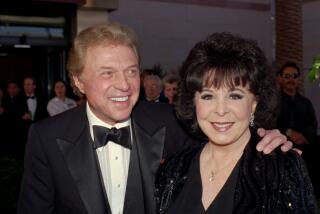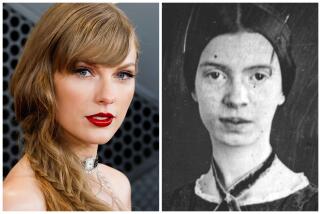Rusty McNeil dies at 81; U.S. folk-music historian who teamed with her husband
Folk singer Rusty McNeil was willing to take her husband-and-wife act on the road in the early 1970s, but the mother of five had one stipulation: “Family had to come first.”
So the McNeils converted a retired 1949 school bus into a home on wheels that they called Amazing Grace because it was “amazing we ever got anywhere,” she later said.
Keith and Rusty McNeil, as they billed themselves, traveled the United States for 15 years on the bus, raising their children and a succession of dogs as they forged a career teaching American history through folk music.
Rusty McNeil died Dec. 15 at her home in Riverside of complications from a stroke she had in early 2009, said her son David. She was 81.
As folk-music historians, McNeil and her husband, who survives her, have left a “recording legacy that will continue to teach a nation of students for years to come,” wrote folk singer Ross Altman in an appreciation on folkworks.org. After the couple stopped touring extensively, they turned to recording boxed sets of folk music built around specific themes in U.S. history, such as the Civil War, the California Gold Rush or western railroads.
What distinguished their recordings was a simple spoken narrative that put each song in historical perspective, an approach that was “unique and very accessible,” said Ellen Chase, whose family owns the Folk Music Center in Claremont.
“They were able to put the music into such a coherent format for teachers and others to learn how the music is entwined with people’s history,” Chase said.
The McNeils also brought together “a great many songs that might otherwise be difficult to track down,” according to a 1989 New York Times review of four releases that included “Colonial & Revolution Songs” and “Working & Union Songs.”
Between them, the couple played more than 30 instruments. Rusty was versed in guitar, autoharp and many rhythm instruments, her son said.
She was born Joan Betty Wilmsmeier on Feb. 12, 1929, in Los Angeles, the second of two daughters of Charles Wilmsmeier, who worked for a petroleum company, and his wife, Beulah.
Only her father used her given name, her son said. Everyone else called her Rusty, a nickname that sprang from her shock of red hair.
While a student at UCLA, she spent the 1949 winter break working at a ski lodge in Yosemite National Park, where she met Keith McNeil, then a Stanford University student and fellow lodge employee.
A year later, they married and she left school, eventually settling in Riverside after Keith went to work for a telephone company.
Folk music was passed down in Keith’s family; Rusty grew up enjoying choral music and nurturing an interest in history.
“We sang to our kids on long trips and around the campfire,” Rusty said in 1998 in the Ventura County Star. “Pretty soon we were doing little programs for kids.”
As civil right activists in the early 1960s, the couple discovered that teaching history through folk songs was an effective “bridge-building tool,” according to a biography on their website.
When Keith decided in 1966 that he wanted to be a full-time musician, he had to convince Rusty to make the leap with him.
She refused to “be the background music in coffeehouses or bars,” David said. “So they kind of invented their own profession teaching the history and background of the material.”
They taught seminars, sang at local high schools and colleges and expanded beyond Southern California after signing with Columbia Artists, which sent them across the U.S. and Canada.
In a clear and pure voice, Rusty would sweetly sing what she once called “the history of the masses, or have-nots.”
Besides her husband, Keith, and son, David, of Moreno Valley, McNeil is survived by another son, Michael McNeil, of Montrose, Colo.; three daughters, Mary McNeil Cheever of Denver, and Jennifer Miller and Sarah McNeil, both of Los Angeles; a sister, Joyce Brown, of Windsor, Calif.; eight grandchildren; and three great-grandchildren.
More to Read
Start your day right
Sign up for Essential California for the L.A. Times biggest news, features and recommendations in your inbox six days a week.
You may occasionally receive promotional content from the Los Angeles Times.







